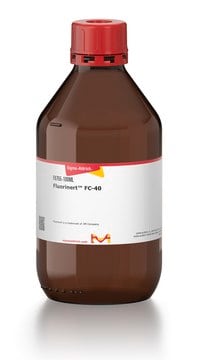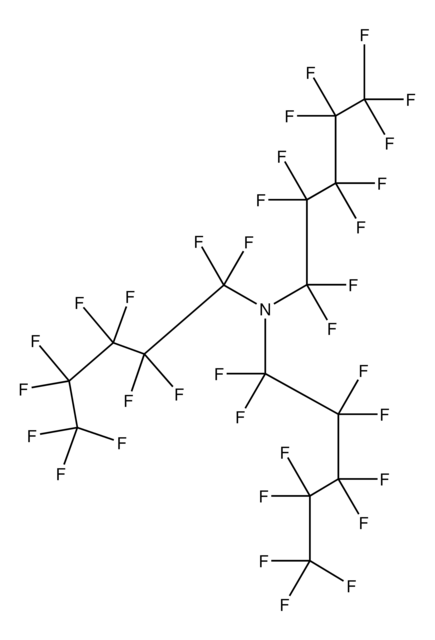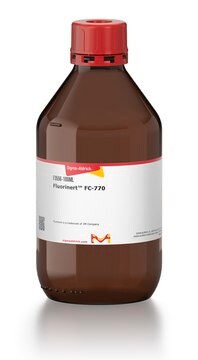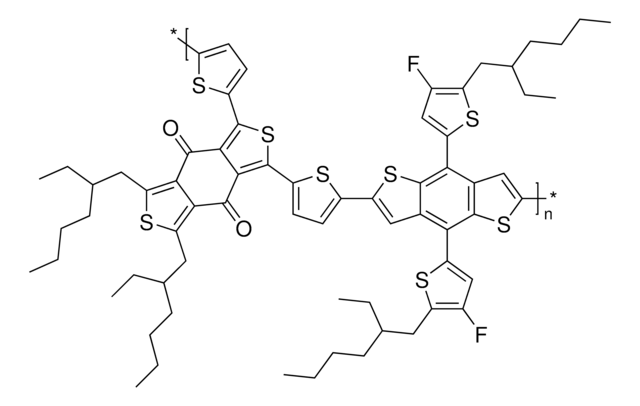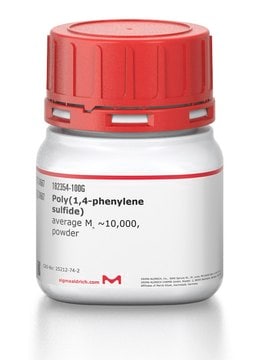469610
Poly[4,5-difluoro-2,2-bis(trifluoromethyl)-1,3-dioxole-co-tetrafluoroethylene]
dioxole 65 mol %
Synonym(s):
PTFE AF, PTFE AF 1600
Sign Into View Organizational & Contract Pricing
All Photos(1)
About This Item
Recommended Products
description
contact angle 104 ° with water
critical surface energy 15.7 dyn/cm
Quality Level
form
solid
composition
dioxole, 65 mol %
dielectric constant
1.934, 1 MHz (ASTM D 150)
hardness
103 (Rockwell, ASTM D 785, 23 °C)
transmittance
>95% (ASTM D 1003)
refractive index
n20/D 1.31
density
1.78 g/mL at 25 °C
Looking for similar products? Visit Product Comparison Guide
General description
Poly[4,5-difluoro-2,2-bis(trifluoromethyl)-1,3-dioxole-co-tetrafluoroethylene] (AF1600) is a fluorinated polymer that is formed by the copolymerization of 2,2-bis(trifluoromethyl)- 4,5-difluoro-1,3-dioxole and 1,1,2,2,- tetrafluoroethylene. It is an optically transparent photo-stable polymer with a high glass transition temperature (Tg), which can be used as a coating in electrochemical and electronic devices.
A tunable, polymeric, photonic material.
Application
AF1600 can form a hydrophobic coating on a silicon wafer that has a contact angle in the range of 115-120° which can be potentially used in agrochemical and printing applications. It may also form a self-assembled monolayer (SAM) on aluminum plates which can be used in the fabrication of water driven triboelectric nanogenerators (WTENGs).
Optoelectronic devices for optical clarity, low-refractive index coating for optical devices, protective coating for chemical resistance, release coating, and sight window for harsh chemical environments.
Physical form
Amorphous copolymer.
Storage Class Code
11 - Combustible Solids
WGK
WGK 3
Flash Point(F)
Not applicable
Flash Point(C)
Not applicable
Personal Protective Equipment
dust mask type N95 (US), Eyeshields, Gloves
Choose from one of the most recent versions:
Already Own This Product?
Find documentation for the products that you have recently purchased in the Document Library.
Preparation of Superhydrophobic Teflon AF 1600 Sub-Micron Fibers and Yarns Using the Forcespinning? Technique.
Rane Y, et al.
Journal of Engineered Fibers and Fabrics, 8(4) (2013)
Wetting of hydrophobic substrates by pure surfactants at continuously increasing humidity
Ivanova NA, et al.
Colloids and Surfaces. A, Physicochemical and Engineering Aspects, 519(1), 71-77 (2017)
Theoretical study of micro/nano roughness effect on water-solid triboelectrification with experimental approach
Lee J and Hwang W
Nano Energy, 52(1), 315-322 (2018)
Properties of thin Teflon AF 2400 coatings deposited onto carbon fabric from solutions in supercritical carbon dioxide.
Kolomytkin DO, et al.
Polymer Science, Series A, 59(1), 42-52 (2017)
Our team of scientists has experience in all areas of research including Life Science, Material Science, Chemical Synthesis, Chromatography, Analytical and many others.
Contact Technical Service![Poly[4,5-difluoro-2,2-bis(trifluoromethyl)-1,3-dioxole-co-tetrafluoroethylene] dioxole 87 mol %](/deepweb/assets/sigmaaldrich/product/structures/951/320/21327fcd-4960-402d-8ae1-bf2e379cb2e2/640/21327fcd-4960-402d-8ae1-bf2e379cb2e2.png)
